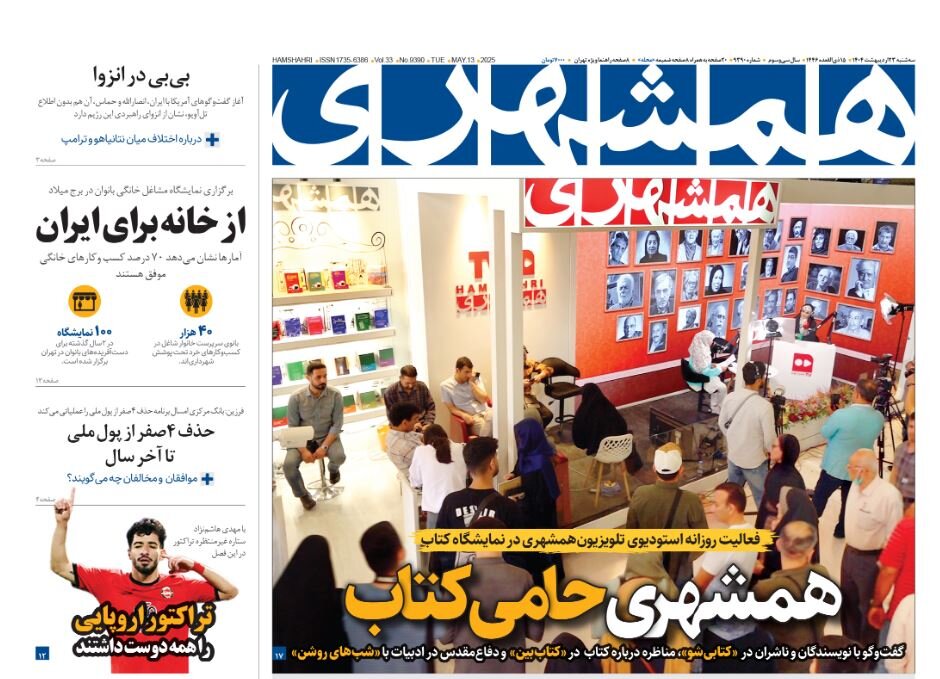Tehran – In the analysis, Hamshali addressed Israeli concerns about promising negotiations between Tehran and Washington regarding Iran’s nuclear program.
It writes: Israeli media writes that even if any agreement is weak, it could lead to Iran’s reinforcement. At the same time as the fourth round of Iran and US speeches in Muscat, Israel’s tough stance is putting pressure on negotiations. Israel believes that a similar agreement to JCPOA II, which limits only the nuclear program, will allow Iran to restructure its economy and strengthen its proxy network, ultimately harmful to the safety of the region. Recent developments show that Iran is still in a difficult situation, but there are still ways to resist. However, if Israel takes military action, especially without fully cooperating with the United States, it could lead to wider tensions in the region. Given these conditions, Iran’s foreign policy must carefully manage these threats.
Ettelaat: The Road to Economic Development
Etterat spoke with Yaghove Rezazadeh, a member of the Congressional National Security and Foreign Policy Committee, about US oil sanctions against Iran. He said: In the context of ongoing negotiations between Iran and the United States, Donald Trump has shown that the United States is unreliable as he imposed oil sanctions on the Islamic Republic on pressure. Therefore, you need to manage negotiations in a way that does not repeat the JCPOA. We must appear authoritative in negotiations and take into account the difficult conditions we have in the economic sector, which ultimately leads to the lifting of sanctions and, as a result, direct negotiations in a way that opens up the economy. Therefore, if we can pursue preparations for trade with European countries without US interference, we can achieve important outcomes by relying on common possibilities. To achieve this, we must make Europeans realize that their dreams with America do not justify the movement to turn away from Iran. In any case, we and the Europeans can reestablish trade and economic relations. This is also important for European countries.
Etemad: Iran and the US have detailed problems
Etemad reviewed the fourth round of Iran and the US in an interview with political analyst Heshmatollah Falahatpishe. He said: The plans for the fifth round of the two countries meant that both sides tried to take into account each other’s concerns and demands. The US knows that the cost of reaching a contract is much lower than without agreement. Without an agreement, a massive wave of costs will fall in the US. Prohibiting Iran from practicing the right to enrich NPT would bear much of a cost to the US. On the far corner of the world, many countries are enriching uranium without nuclear weapons. This means that Iran will not be deprived of these rights. Currently, more diplomatic shuttles are underway in the region, and Iran must promote this situation for economic and security relations. Israel becomes even more isolated if regional relations are pursued in the form of collective security. Recent developments show that the US does not want to act in the form of Netanyahu’s security and military policy, and this is the biggest opportunity Iran can use.
Iran: The key role of Oman as a mediator
The Iranian newspaper spoke with former Iranian ambassador Mohammad Keshawartz Zadeh about the importance of Oman’s role in recent negotiations between Iran and the US. He said: Oman has played a positive and effective role in maintaining diplomatic channels and creating opportunities to explore new ideas. The US has sought to turn Muscat conversations into a prominent conference by changing the media tone on some underlying issues, but it appears that it is Oman’s active involvement that has succeeded in managing the course of the lecture. Also, Araguchi’s talks with key Arab players such as Saudi Arabia, Qatar and the United Arab Emirates were a wise move that could at least prepare a local atmosphere that would hinder calm and tension-free negotiations. Iran has been able to involve regional countries in the diplomatic process and have Asian partners such as China and Russia on board. Now is the time for Washington to show his will to resolve the main differences. Especially on issues like concentration.

